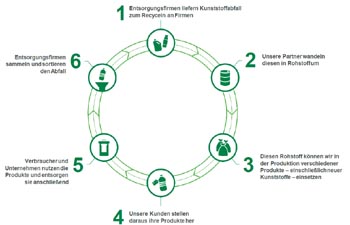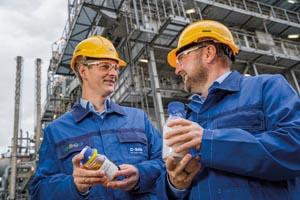Berlin, Dezember 2018
"Mit chemischem Recycling wollen wir hier einen signifikanten Beitrag leisten, die Menge des Kunststoffmülls zu reduzieren“,
sagt Dr. Martin Brudermüller, Vorsitzender des Vorstands und Chief Technology Officer (CTO) der BASF SE.
Infographic

New ground in plastic waste recycling
BASF is breaking new ground in plastic waste recycling with its ChemCycling project. Chemical recycling provides an innovative way to reutilize plastic waste that is currently not recycled, such as mixed or uncleaned plastics. Depending on the region, such waste is usually sent to landfill or burned with energy recovery.
But chemical recycling offers another alternative: Using thermochemical processes, these plastics can be utilized to produce syngas or oils. The resulting recycled raw materials can be used as inputs in BASF’s production, thereby partially replacing fossil resources.
BASF Verbund production offers ideal conditions for ChemCycling
At the beginning of the production chain, BASF feeds oil derived from plastic waste
by an oiling process into the Production Verbund. BASF gets this feedstock for the
pilot products from the partner Recenso GmbH, Germany. As an alternative, syngas
made from plastic waste can also be used.
The steam cracker is the
starting point for Verbund production. It breaks down or “cracks” this raw material at
temperatures of around 850 degrees Celsius. The primary outputs of the process
are ethylene and propylene. These basic chemicals are used in the Verbund to
make numerous chemical products. Under the mass balance approach, the share
of recycled raw material can be mathematically allocated to the final certified
product. Each customer can select the allocated percentage of recycled material. |
Dr. Stefan Gräter and Dr. Andreas Kicherer are
showing a sample of pyrolysis oil and thus
produced plastic in front of the Steamcracker

Technological and regulatory challenges
However, technological and regulatory conditions must be met before the project is market-ready. For one thing, the existing technologies to transform plastic waste into recycled raw materials such as pyrolysis oil or syngas must be further developed and adapted so that consistently high quality is assured.
Furthermore, regional regulatory frameworks will considerably influence to what extent this approach can be established in each market.
|